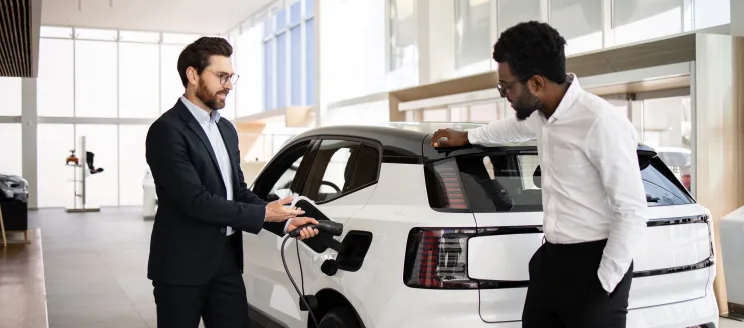
5 Things to Know Before Buying an EV
Buying a car is a big financial decision that takes a lot of consideration. Making the switch to an electric vehicle (EV) is also a big (and exciting) decision for your life and for the climate. As you look for the perfect EV for your lifestyle, it’s important to think about how EV ownership differs from owning a gas-powered car.
1) Types of EVs- There are three types of electric vehicles: hybrid electric vehicles, plug-in hybrid electric vehicles (PHEVs), and fully electric vehicles (EVs). Hybrid electric vehicles (also known as hybrids) have a combustion engine and an electric motor. The battery in a hybrid is charged by regenerative breaking and engine power. Plug-in hybrid electric vehicles have a gas tank and are recharged by both regenerative breaking, engine power, and by a plug-in electrical outlet. Fully electric vehicles are only powered by electricity and need to be charged at electrical outlets. Decide which type of EV fits your needs based on how often you drive, how far your average trip is, and how often you plan to charge.
2) EV Charging Levels - There are three types of EV charging levels: Level 1, Level 2, and Level 3. Both Level 1 and Level 2 are home chargers. The differences between them are how fast they charge vehicles and the amount of power they use.
Level 1 chargers use a standard 120-volt outlet, the same you’d use to charge your phone. These chargers are very common but have the slowest charging rate of about 2-5 miles of charge for 1 hour. Level 1 may be the home charger for you if you have a shorter commute or don’t drive very often.
Level 2 chargers use a 240-volt outlet, the same kind electric clothes dryers use. Some homes are already equipped with the appropriate outlet, but many homes will require some additional electrical work, which can be expensive. These charge EVs at a rate of 10-20 miles of charge per 1 hour of charging.
Level 3 charging or DC charging is the fastest and most powerful of the three and can be equated to a gas station. These are found at public charging stations.
3) Cost of Energy - The expense of charging your vehicle at home will become part of your monthly utility bill. On average, it costs about half as much to fuel a vehicle with electricity compared to the cost of filling a car with gasoline. If you do choose an EV, there are resources to help evaluate what electrical rate plan might be best for you. Southern California Edison (SCE) has designed a “Time of Use” or TOU-D-PRIME rate which offers lower electricity at lower rates between 8:00 am and 4:00 pm and after 9:00 pm, so charging is encouraged during these hours.
4) Cost of EV Purchase and Maintenance - According to Kelly Blue Book, the average price of a new electric vehicle as of August 2024 was $56,575 ($49,075 after the $7,500 federal tax credit) compared to $47,870 for the average price of a new gas-powered car. While EVs are more expensive up front, the maintenance costs are lower over the car’s lifetime. Fully electric vehicles have no engine and require no oil changes but wear and tear on tires may be more frequent due to the weight of the battery. According to a Consumer Reports study from 2023, long-term ownership can save $6,000 to $13,000 over the lifetime of the vehicle.
5) Rebates and Tax Credits - There are several federal and local incentives available to help you switch to an EV today! The IRS offers a federal tax credit of up to $7,500 for the purchase of a new EV or fuel cell vehicle (see IRS.gov for details). Of course, there are rebates for EVs, chargers, and make ready electrical work available through Santa Barbara Clean Energy’s Residential EV Program.
More questions? Santa Barbara Clean Energy can help!
As we seek to further reduce emissions in our community, Santa Barbara Clean Energy wants our customers to feel confident in their decision to switch to an EV. For more information about electric vehicles, chargers, and preparing your home to go electric, give us a call at (805) 911-7699 or email us at SBCEPrograms@SantaBarbaraCA.gov.
Santa Barbara Clean Energy is a not-for-profit program of the City of Santa Barbara that supplies clean, cost-competitive electricity for homes and businesses in the City of Santa Barbara.
